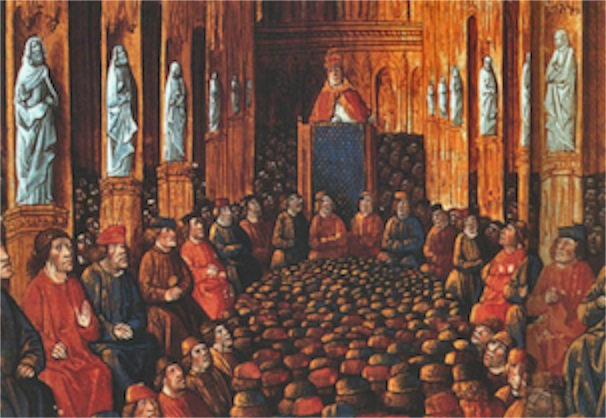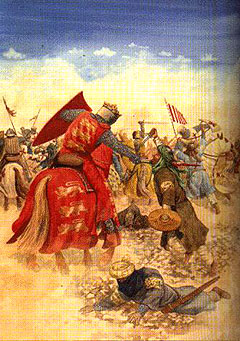The Crusades
27/11/12 05:45
Back in the early 11th century, the power of the church to influence political decisions was great. With great power often comes great controversy. We like to bemoan the partisanship and divisiveness in the halls of congress in our time, but we didn’t invent the either-or forcing of people to take sides. Power politics have been around for a long time. From the perspective of peasants and common people, there was little distinction between government and the church. Royal leaders influenced the choice of church leaders and church leaders participated in the crowing of royals. They all lived in the midst of luxuries that were unthinkable for those of lower rank.
In April of 1073, Hildebrand of Sovana was named Pope Gregory VII. He undertook the task of reforming the church and clarifying its relationship with royal authority. He almost immediately raised the ire of Henry IV, who as then Holy Roman Emperor. The argument was over how the cardinals should elect the pope. The conflict wasn’t as simple as the rules of election by the College of Cardinals, but also went to the core of the process of how bishops were raised to become cardinals and the role of the emperor in the whole process. Gregory was an advocate of the strongest papacy possible and claimed that the pope must always be a higher authority than the emperor.
The emperor declared that the papacy of Gregory was invalid. He appointed Clement III, who has been dubbed the antipope, to oppose Gregory and his reforms. Gregory, in turn excommunicated Henry not once, but twice. It all makes for pretty dry reading in church history books, but it was a time of great controversy and intrigue in the church.
Gregory died in May of 1085 and was succeeded by Otho de Lagery who was named Pope Urban II. Urban was one of Gregory’s strongest supporters and reigned as head of the church for a little over eleven years. Urban was a bit more diplomatic than Gregory but the troubles with Clement III persisted. His papacy was mostly an extension of the policies instituted by Gregory.
 There was one speech, however, that changed how history remembers Urban II. It was made on this day in 1095. It has been dubbed the most influential speech of the Middle Ages. At the Council of Clermont, in France, before several hundred clerics and noblemen, Urban asked rich and poor to stop fighting between themselves. He asked noblemen and clerics to cease their disagreements. Instead, he urged them to engage in a war to take back Jerusalem from the Seljuk Turks who had taken control of the city and who were threatening to invade the Byzantine Empire and take control of Constantinople. Urban had received several requests for help from Byzantine Emperor Alexius I, but he chose to make Jerusalem, not Constantinople the focus of his appeal for an army.
There was one speech, however, that changed how history remembers Urban II. It was made on this day in 1095. It has been dubbed the most influential speech of the Middle Ages. At the Council of Clermont, in France, before several hundred clerics and noblemen, Urban asked rich and poor to stop fighting between themselves. He asked noblemen and clerics to cease their disagreements. Instead, he urged them to engage in a war to take back Jerusalem from the Seljuk Turks who had taken control of the city and who were threatening to invade the Byzantine Empire and take control of Constantinople. Urban had received several requests for help from Byzantine Emperor Alexius I, but he chose to make Jerusalem, not Constantinople the focus of his appeal for an army.
In his speech, Urban denigrated all Muslims, exaggerated stories of their anti-Christian acts, and promised absolution and remission of sins for all who died in the service of Christ. In a way that is strangely reminiscent of the stories that are told today about extremist Muslim suicide bombers, Urban urged Christians to sacrifice themselves in war for the promise of a guaranteed entrance into heavenly glory.
The speech was a rousing success. The clerics who heard it drummed up support for the war all across Europe. Between 60,000 and 100,000 people responded to the call to march on Jerusalem. They were a rag-tag and undisciplined group, with a handful of nobles, who responded in hopes of increasing their wealth. Along the way to Jerusalem, the nobles used the enthusiasm of the peasant fighters to seize the lands and property of innocents and increase their wealth. At first it seemed that the untrained and inexperienced Christian peasants could not possibly prevail against the trained, professional Muslim armies, but the sheer numbers of Christians enabled a bloody victory. Jerusalem fell into Christian hands.
News traveled slowly in those days. Urban died two weeks after the Christian victory in Jerusalem, but not before the news reached him.
The Crusade became the first of seven bloody campaigns fought over the next two centuries all of which have been bundled by historians with the name of the Crusades. In general they pitted Christians against Muslims and were based on radical misinformation about the beliefs and actions of Muslims.
The theological details of Gregory’s argument with Emperor Henry IV have faded into historical obscurity and are known only to a handful of church historians. The seat of the pope eventually became a country within a country with the Vatican raising its own police and army and acting as a governmental entity among other governments while at the same time maintaining the role of the pope as the head of the Roman Catholic Church. The Protestant Reformation re-shaped the face of Christianity and decreased the authority of the central hierarchy of the Roman Church.
 But the effects of the Crusades linger more than 900 years after Urban’s speech. There are still many who speak of the disagreement between Christians and Muslims as irreconcilable and who call for a holy war to wipe out Muslims. The killing of innocents, radical promises of afterlife rewards, and the demonizing of those who have different beliefs continue to be elements of contemporary rhetoric. Jerusalem is clearly under the control of the modern state of Israel, but its claim to the city is constantly questioned by Palestinians and others. Christians, Muslims and Jews worship in the heart of the city in relative peace, but not without distrust and suspicion.
But the effects of the Crusades linger more than 900 years after Urban’s speech. There are still many who speak of the disagreement between Christians and Muslims as irreconcilable and who call for a holy war to wipe out Muslims. The killing of innocents, radical promises of afterlife rewards, and the demonizing of those who have different beliefs continue to be elements of contemporary rhetoric. Jerusalem is clearly under the control of the modern state of Israel, but its claim to the city is constantly questioned by Palestinians and others. Christians, Muslims and Jews worship in the heart of the city in relative peace, but not without distrust and suspicion.
The lesson of the history that unfolded from Urban’s speech is that no war is holy. God doesn’t take sides in human conflicts. Corruption and crime occur on both sides of wars. But charismatic leaders can still whip up the frenzy of crowds with exaggerations and untruths.
As dusty and dry as is the history of the Middle Ages, it is filled with lessons that we forget at our own peril and the peril of generations yet unborn.
In April of 1073, Hildebrand of Sovana was named Pope Gregory VII. He undertook the task of reforming the church and clarifying its relationship with royal authority. He almost immediately raised the ire of Henry IV, who as then Holy Roman Emperor. The argument was over how the cardinals should elect the pope. The conflict wasn’t as simple as the rules of election by the College of Cardinals, but also went to the core of the process of how bishops were raised to become cardinals and the role of the emperor in the whole process. Gregory was an advocate of the strongest papacy possible and claimed that the pope must always be a higher authority than the emperor.
The emperor declared that the papacy of Gregory was invalid. He appointed Clement III, who has been dubbed the antipope, to oppose Gregory and his reforms. Gregory, in turn excommunicated Henry not once, but twice. It all makes for pretty dry reading in church history books, but it was a time of great controversy and intrigue in the church.
Gregory died in May of 1085 and was succeeded by Otho de Lagery who was named Pope Urban II. Urban was one of Gregory’s strongest supporters and reigned as head of the church for a little over eleven years. Urban was a bit more diplomatic than Gregory but the troubles with Clement III persisted. His papacy was mostly an extension of the policies instituted by Gregory.

In his speech, Urban denigrated all Muslims, exaggerated stories of their anti-Christian acts, and promised absolution and remission of sins for all who died in the service of Christ. In a way that is strangely reminiscent of the stories that are told today about extremist Muslim suicide bombers, Urban urged Christians to sacrifice themselves in war for the promise of a guaranteed entrance into heavenly glory.
The speech was a rousing success. The clerics who heard it drummed up support for the war all across Europe. Between 60,000 and 100,000 people responded to the call to march on Jerusalem. They were a rag-tag and undisciplined group, with a handful of nobles, who responded in hopes of increasing their wealth. Along the way to Jerusalem, the nobles used the enthusiasm of the peasant fighters to seize the lands and property of innocents and increase their wealth. At first it seemed that the untrained and inexperienced Christian peasants could not possibly prevail against the trained, professional Muslim armies, but the sheer numbers of Christians enabled a bloody victory. Jerusalem fell into Christian hands.
News traveled slowly in those days. Urban died two weeks after the Christian victory in Jerusalem, but not before the news reached him.
The Crusade became the first of seven bloody campaigns fought over the next two centuries all of which have been bundled by historians with the name of the Crusades. In general they pitted Christians against Muslims and were based on radical misinformation about the beliefs and actions of Muslims.
The theological details of Gregory’s argument with Emperor Henry IV have faded into historical obscurity and are known only to a handful of church historians. The seat of the pope eventually became a country within a country with the Vatican raising its own police and army and acting as a governmental entity among other governments while at the same time maintaining the role of the pope as the head of the Roman Catholic Church. The Protestant Reformation re-shaped the face of Christianity and decreased the authority of the central hierarchy of the Roman Church.

The lesson of the history that unfolded from Urban’s speech is that no war is holy. God doesn’t take sides in human conflicts. Corruption and crime occur on both sides of wars. But charismatic leaders can still whip up the frenzy of crowds with exaggerations and untruths.
As dusty and dry as is the history of the Middle Ages, it is filled with lessons that we forget at our own peril and the peril of generations yet unborn.